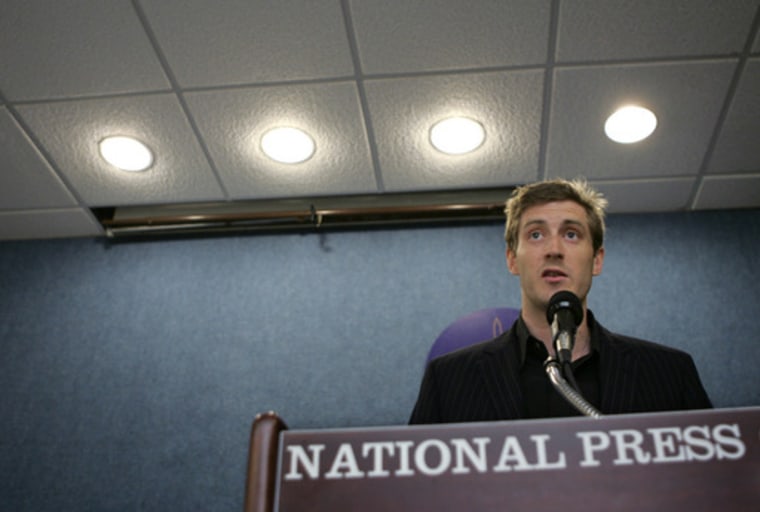The Beijing Olympics have left the world’s human rights groups frustrated and angry — convinced that China has been let off the hook for serious abuses, and adamant that future hosts like Russia must be held to a higher standard.
Western activists also are disappointed that among the thousands of athletes at the games, few have made even low-key efforts to speak out about political repression or China’s economic ties to Sudan, where violence has raged in Darfur.
“Even if there was an athlete that wanted to speak out on issues of human rights, he might be silenced by whatever IOC official is mediating that press event,” Darfur activist and former U.S. Olympian Joey Cheek said in an e-mail Wednesday to The Associated Press.
Cheek, co-founder of a group of athletes known as Team Darfur, had his visa revoked by Chinese authorities hours before he was to embark for Beijing. Team Darfur athletes who are in Beijing have acceded to International Olympic Committee curbs on political comment, resulting in what Cheek called “massive suppression of any voice that the government doesn’t want heard.”
Prominent human-rights groups have castigated the IOC and the games’ major corporate sponsors for their reluctance to place any public pressure on China on such issues as political dissent and press freedom.
“The Chinese government’s own voluntary pledges to improve human rights, allow public protests and guarantee ’complete freedom to report’ made meeting these self-set human rights benchmarks one of the tests for a successful Olympics,” Minky Worden of Human Rights Watch said in an e-mail from New York. “That is a test that both Beijing and the IOC have failed.”
She said the Beijing games, rather than bequeathing a positive legacy, “may leave in place permanent technological surveillance and monitoring networks that make doing human rights work even more dangerous and difficult for Chinese citizens.”
Human Rights Watch and Amnesty International are calling on the IOC to establish a more rigorous process for assessing the human-rights records of countries which bid for and host future Olympics.
Worden said there was urgent need for such reform, given that Russia will be hosting the 2014 Winter Games.
“The Olympics-related rights violations well documented in China — forced evictions, abuse of migrant workers, repression of civil society — will almost certainly be replayed in Russia,” Worden wrote last week in a commentary for the International Herald Tribune. “But it could get even uglier: In Russia, journalists are not only harassed, they are sometimes murdered.”
Mark Allison, a Hong Kong-based researcher for Amnesty International, expressed dismay over the detentions of numerous Chinese activists in recent weeks. He alleged that Chinese authorities were expanding the use of “re-education through labor” — a punishment which can be imposed without trial or judicial review — and bemoaned the lack of public comment by the IOC.
“Silent diplomacy is fine but it has to be matched by change on the ground,” Allison said by telephone. “If there’s no evidence of change, you have to back that up with public pressure.”
He said human rights should be a higher priority as cities compete to host the games, and urged the IOC to develop a “concrete way” of measuring their records.
The IOC has met with Amnesty and Human Rights Watch, but IOC spokeswoman Giselle Davies indicated their proposals would likely be rebuffed.
“We’re a sports organization. ... we stay clearly within our role, which is to bring sport to host countries,” she said Wednesday. “We’re not an organization that is best placed or has the capacity to deal with human rights issues.”
At the daily Olympic press briefing, journalists have been given short, blunt responses to questions about the outlawed spiritual group Falun Gong and the Free Tibet movement, whose supporters have staged several protests during the games.
“Tibet is part of China — the whole world knows that,” said Wang Wei, a top official of Beijing’s Olympic organizing committee. “The Free Tibet movement is not welcome here.”
An example of how warily some athletes are approaching these controversies: A pro-Tibet group said Wednesday that more than 40 Olympians in China had downloaded a “Songs for Tibet” album in solidarity with the cause, but the group said it wanted to protect the athletes’ anonymity, and no names were released.
Among the many activists following the games from afar is Wang Dan, a student organizer of the 1989 Tiananmen democracy movement who’s now based in the United States.
“The goal for the Chinese government is to promote nationalism further,” he said in an e-mail. “But ironically, the Olympic Games exposed more social crises than ever, like the Tibet issue, to the Chinese people.”
Press freedom has been a major area of concern. Dozens of politically related Web sites have been blocked at the Olympic press center, and Chinese authorities have sought to curtail reporting by local and foreign journalists of protests and dissent.
Sharon Hom, executive director of New York-based Human Rights in China — whose Web site has been among those blocked — said foreign journalists looking into human rights problems have faced “intimidation and crude police tactics.”
She also suggested the Olympic press corps has underreported the impact of the surveillance and security infrastructure installed for the games, including collection of data on the many foreign visitors.
Bob Dietz, Asia program coordinator for the Committee to Protect Journalists, said by telephone from Hong Kong that China has largely succeeded in controlling news coverage during the games.
“In the end, they pretty much defined the terms in which the media was going to operate,” he said. “Those terms are not the same as in the Western world.”
Dietz expressed concern that governments elsewhere, including Russia, would emulate the Chinese, coupling support for a free-market economy with heavy-handed control of the media.
“That approach resonates in a lot of places,” he said.
